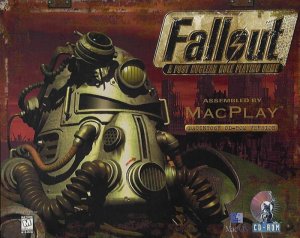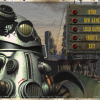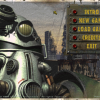A devastating nuclear war had wiped out almost the entire population of the Earth. The civilization, as we know it, has been destroyed. The Earth has become a huge wasteland populated by mutated creatures. Only small number of humans survived and they formed communities living on the surface, where they mostly scavenge what remains from the pre-war civilization. Some lucky people managed to reach safety of the Vaults, huge underground dwellings, during the war. Recently, the water purification controller chip in Vault 13 broke. Without clean water, the people of the Vault cannot survive. One person is sent to find a replacement chip and ventures outside to face a dangerous world, hoping to return within a hundred and fifty days.
Fallout is a role-playing game that utilizes a character development system called S.P.E.C.I.A.L., an acronym formed from the first letters of the game’s basic character attributes: Strength, Perception, Endurance, Charisma, Intelligence, Agility and Luck. In addition to having these attributes, the protagonist can also learn and improve skills, as well as acquire traits and perks.
Skill points are awarded when the player character levels up; traits are assigned during character creation, while perks are obtained every three character levels. There are eighteen different skills in the game, divided into combat, active, and passive categories. Combat skills include weapon proficiencies (e.g. small and big guns, melee, etc.); active skills are used for support or interacting with the environment (doctor, lockpick, science, steal, and others); passive skills are mainly dedicated to social interaction (barter, speech, gambling, and so on). Traits bestow various benefits upon the character while also imposing penalties; in contrast, perks are purely beneficial. By developing and customizing attributes, skills, traits and perks, the player is granted a considerable freedom in shaping the protagonist in his combat-related and social behavior.
The game has an open world which can be freely explored from the onset. Only a few quests are required to complete in order to advance the main plot; a vast amount of side quests is available. Thanks to the game’s emphasis on social interaction, many problems can be solved in a non-violent way; in fact, it is possible to complete the game without engaging in battles at all, running away from enemy encounters and concluding the final confrontation in a relatively peaceful fashion. Conversely, the player can opt for a destructive path, killing everyone in sight. A Karma system is used to track the player’s moral decisions during the game.
Combat in Fallout is turn-based. Participants have a limited amount of action points (AP) per turn; each action (including movement) depletes a certain number of AP, eventually ending a character’s turn. The player can target specific body parts of enemies during battles. Characters may join the protagonist, traveling together and participating in combat as a party. Though the player may assign general commands to the companions, their actions are controlled by the AI, and they cannot be customized.




